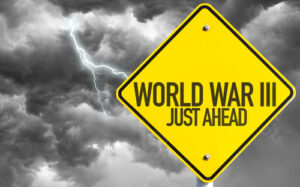The Heathrow Incident: Is It Really an Act of War?

In recent events, the geopolitical landscape has become a riveting narrative of warfare and intrusions, with the British press often echoing a sentiment of invincibility when it comes to national security. A recent incident at Heathrow Airport—which experienced a 24-hour shutdown due to an electrical fire—has sparked intense speculation. Some outlets are suggesting that this might be an orchestrated act of war by Russian President Vladimir Putin. But the question remains: are we really teetering on the brink of World War III over an airport mishap?
A Curious Narrative
It seems that in the current climate of heightened tensions, even a relatively mundane event like an electrical fire can be construed as a plot against national security. The Telegraph, a primary source of this narrative, has circulated the notion that among the myriad of spies expelled from the UK, Putin is now depending on a mix of foreign agents and local miscreants to enact sabotage across Europe. The report highlights individuals, such as a 20-year-old Brit named Dylan Earl, who claimed responsibility for burning down a Ukrainian-owned business in London.
Rethinking the Reaction
While it is understandable that the media thrives on engaging its audience with sensational headlines, it’s critical for readers and investors to analyze the motives behind this reporting. Much of the rhetoric surrounding national security seems to invite fear and panic rather than constructive dialogue. The question arises: does this line of thought serve to distract from serious diplomatic discourse or other pressing issues like economic stability and inflation?
The Broader Economic Implications
At Extreme Investor Network, we believe that framing such incidents as acts of war might pave the way for rash decisions that could have severe economic repercussions. Global markets thrive on stability and predictability; therefore, any escalation in military rhetoric could lead to investor apprehension. Consider the potential fallout:
-
Increased Defense Spending: Should the narrative continue to evolve towards direct conflict, nations may be prompted to allocate substantial portions of their budgets to defense, diverting crucial funds from vital public services and infrastructure.
-
Investor Sentiment: Heightened tensions can lead to volatile market conditions. Investors should remain vigilant, as perceptions of instability can lead to rapid shifts in financial markets.
- Global Supply Chains: Blame-game tactics can lead to resource hoarding and reduced cooperation on international trade, ultimately disrupting supply chains and causing inflation.
Finding a Path Forward
Rather than fostering fear, we believe a constructive approach rooted in dialogue and diplomacy can yield better outcomes for all parties involved. As investors, it’s crucial to remain informed, question narratives that appear exaggerated, and consider the broader economic contexts they may influence.
Conclusion
The Heathrow fire may be an unfortunate incident, but the suggestion that it heralds a new world war is disproportionate. In an age where news cycles constantly amplify anxiety, keeping a level-headed perspective is vital. Let’s remember: sound investment decisions thrive on clarity and stability, not fear-driven narratives.
To stay ahead of the curve in understanding global economic dynamics, subscribe to Extreme Investor Network for continued analysis from seasoned experts. We offer insights that cut through the noise, focusing on what truly matters for you as an investor and a global citizen.

